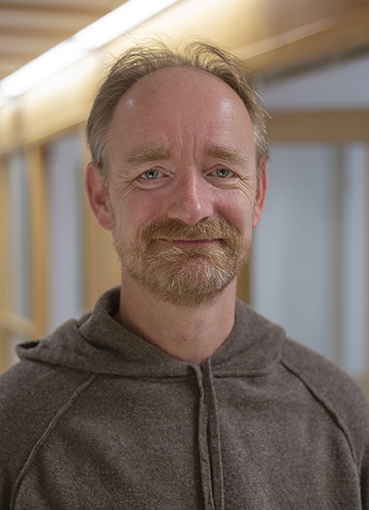Alumni Spotlight: Michael Stausberg

This interview was also published in our newsletter. Sign up here.
"Religious innovation is ongoing; new religions or religious groups keep on coming and going all the time. In our new book we are not interested in the coming, but in the going", says Michael Stausberg.
Together with James Lewis he lead the CAS project Demise of Religions back in 2018-2019. He is now out with a new book The Demise of Religion: How Religions End, Die, or Dissipate which he has edited together with the CAS project participants Carole M. Cusack and Stuart A. Wright.

We talked with the scholar about his new publication and his stay at the Centre.
- Read also: Making "demise" a topic in religious studies
- Read also: Alumni Spotlight: Erica Baffelli
Your book "The Demise of Religion: How Religions End, Die, or Dissipate," based on CAS research, was recently published. Congrats!
Thank you! In our CAS group we worked on cultures and religions from the ancient world and from the contemporary period. This volume represents some output of those working on the present. We have a series of articles on the past coming out as a special issue of an international journal in a couple of months. Thanks to funding from CAS, both publications are available as open access.
You ask the question: Do religions end?
Actually, the main title of the book is a tad misleading, but the subtitle captures our agenda.
We are not interested in predicting the end of religion in the singular, as a sphere of human concern and activities, but in the historical fate of specific religions or religious groups. As far as we know, ours is the first book in English to address this question.
Religious innovation is ongoing; new religions or religious groups keep on coming and going all the time. In our book we are not interested in the coming, but in the going. This, of course, raises many questions. For example, how does one measure this end? When the last adherent or “player” dies or turns away? When an organization is dissolved, for whatever reasons? When is a religion actually “dead”? When all its traces have disappeared, or when people no longer consider them functional in the sense of no longer relevant or efficient in achieving its postulated goals?
Of course, there are actors who would like to seal the end of their competitors, who tend to be unwilling to play their part in this script. Even when religions have been officially abolished, former adherents may still not be done with the past. In the first chapter
Why is it interesting to look at the demise of religions?
Religions demand a lot of their adherents to remain vital and resilient. Focusing on origins and success stories blinds us to greater parts of historical reality, namely that decline, demise, and eclipse are part of history and we cannot continue to write religious history in continuity mode. While we were conducting our research in Oslo, extinction and decline in nature became hot topics in public discourse and awareness. Language death has been widely documented and researched. In history, the demise of empires has found renewed interest. Religion should no longer be considered immune to these developments.
Focusing on origins and success stories blinds us to greater parts of historical reality, namely that decline, demise, and eclipse are part of history.
What religions do you write about in your book?
The volume covers a range of diverse religions or religious groups in countries such as France, Japan, Papua New Guinea, Sweden, the UK, and the US. We can distinguish between endogenous (internal) and exogenous (external) causal trajectories. Let me describe some of these. A main problem for many religions is leadership. On the one hand, the death of founding figures invariably poses problems, but on the other hand leaders can also fail to sustain the enthusiasm of their followers. They can betray people and their missions or commit crimes resulting in their arrest or even executions; well-known examples include Knutby Filadelfia in Sweden and Aum Shinrikyō in Japan. And then there are the cases where leaders incite mass suicides or mass homicides, resulting the self-destruction of these groups.
When it comes to exogenous factors, it is well known that China persecutes religious groups, but it is less well-known that state agencies – even in Western democracies like France and the United States – have raided religious groups; such state actions have resulted in the demise of religions.
Looking back at your stay at CAS, how would you describe it?
In retrospect, we were lucky that we could benefit from ordinary, pre-pandemic circumstances. And we were fortunate that we right from the start enjoyed an excellent spirit of collaboration, mutual critical support and friendship in the group. I appreciate that the CAS leadership let us do exactly what worked best for us. CAS works as a wonderful refuge and laboratory. With one exception, none of us lived or worked in Oslo, so we explored the city together and dived into all sorts of cultural activities. We also had lots of fun with the other groups at CAS.
In retrospect, we were lucky that we could benefit from ordinary, pre-pandemic circumstances.
How has your work developed after your stay?
Work on the CAS project did not end when the time in Oslo was over. But now at least the publication work is finished. One thread that developed in conjunction with the CAS work is research on religious minorities. Together with Erica Baffelli, a fellow from our CAS group, I am currently planning a landmark publication on this topic, and together with a colleague at my department in Bergen, Alexander van der Haven, I will soon launch a fully digital master’s degree program on religious minorities.
I have not made up my mind about some other ideas that I keep on entertaining. What I would really love to do, though, is to get around to reading a selection of the books that keep on piling up in my office and on my e-reader. Just read widely, without having to think whether this could be useful for any of my own research or teaching.